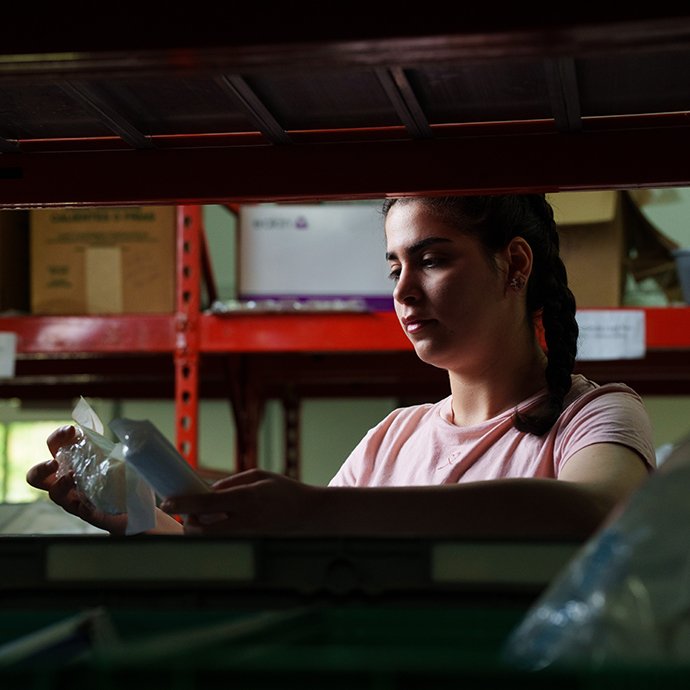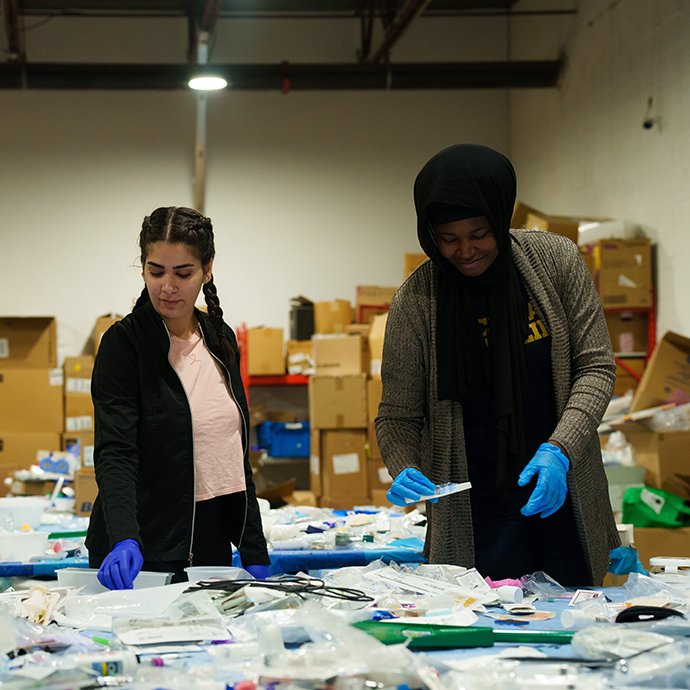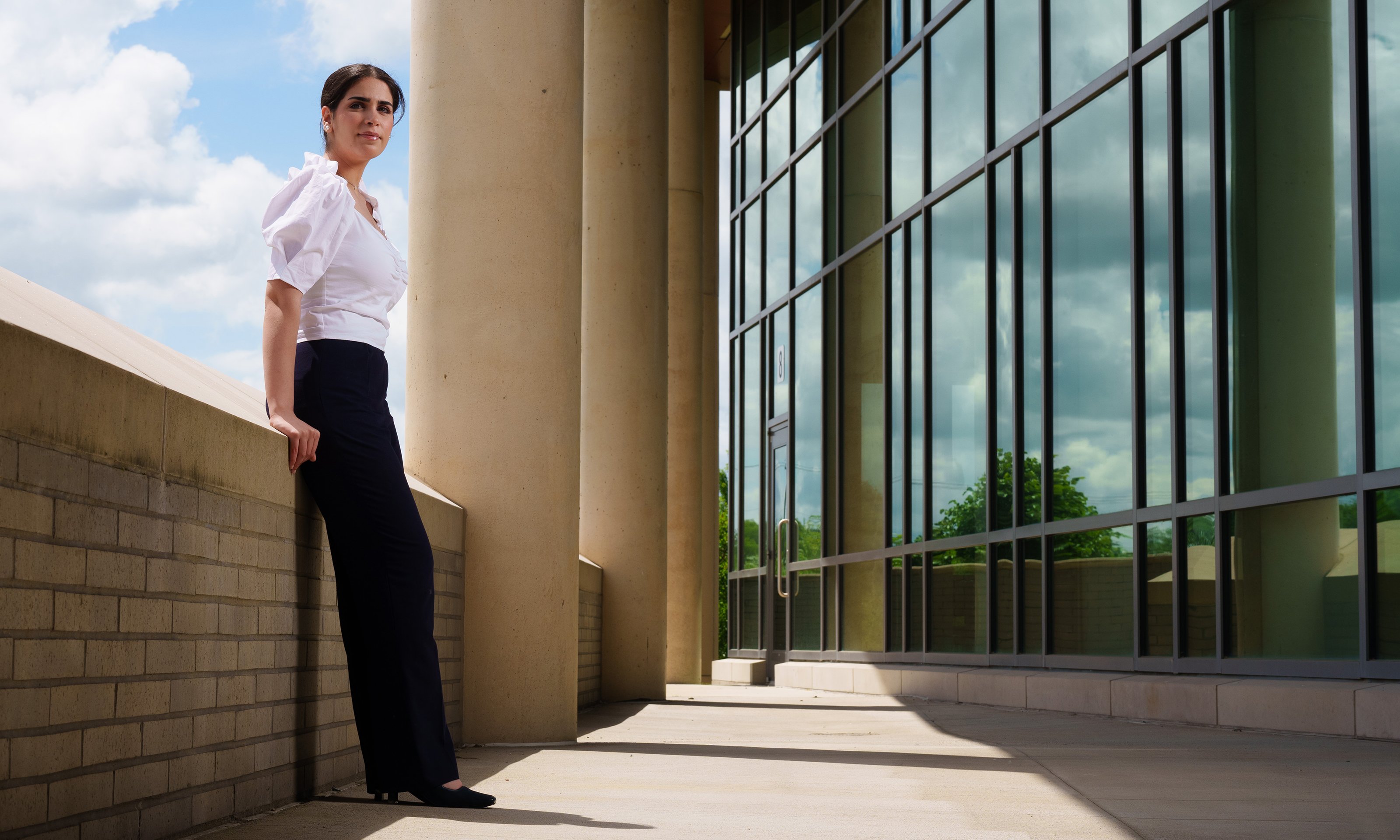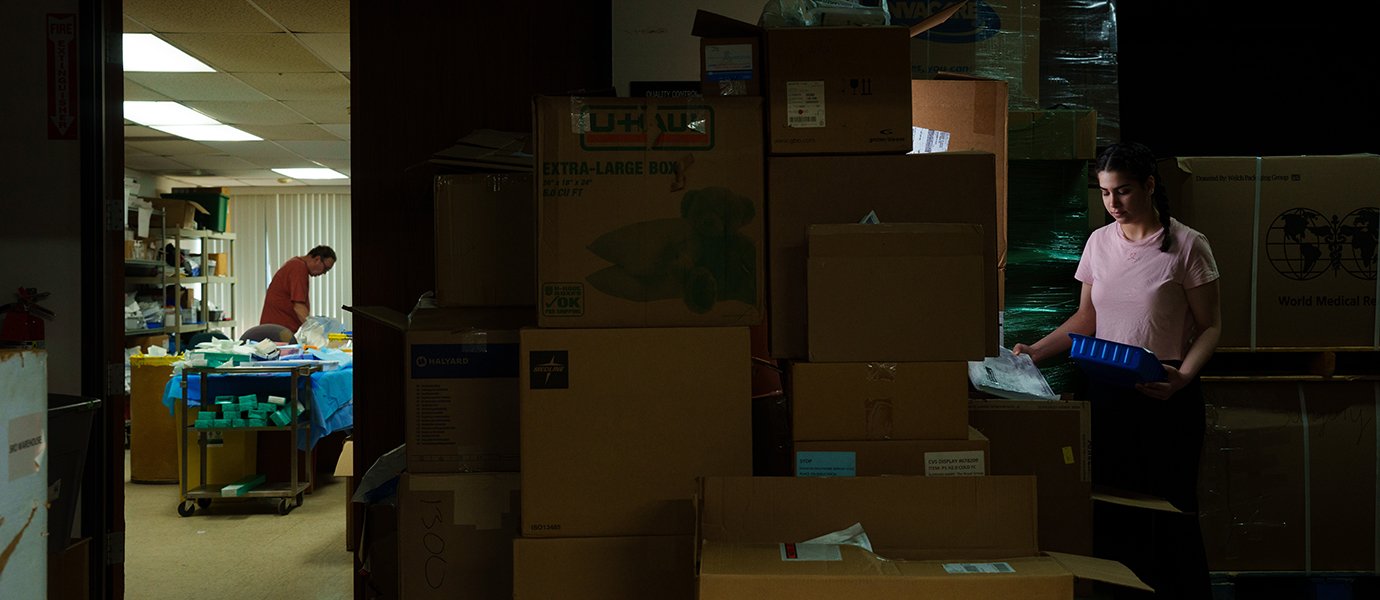Nedi Affas, SHS ’23, decided that she wanted to be a doctor when she was 8 years old, after her father died due to poor medical care in her native country of Iraq.
“I was really young at that time, but I was thinking, ‘What if there was something I could have done? If I was a doctor myself, I could have saved him,’” Affas says.
Now 23, Affas’ commitment to her goal has only strengthened with time. She’ll start medical school this fall at Oakland University William Beaumont School of Medicine (OUWB). But she’s persevered through incredible challenges, including even more family loss, immigration and navigating undergraduate studies at OU as a first-generation college student, to get there.
 |
| Affas volunteering at World Medical Relief in Southfield, Michigan. |
“There were so many instances where, for example, I didn’t do well on an exam and I basically thought, ‘Oh my God, I’m a failure. I’m never getting into med school. I’m never going to become a doctor like I’ve always wanted to become,’’’ Affas recalls. “And then I had those people that kind of got me back up on my feet and reminded me that, ‘No, it’s not the end of the world. You will do good. You will overcome that.’”
While the death of Affas’ father planted the seed of her interest in a medical career, another major family health challenge helped cement it. Affas immigrated to the U.S. with her mother in 2013, and they were soon followed by Affas’ grandparents, who were both diagnosed with late-stage cancer during their health checks upon entering the country. Affas says the fact that neither of them had received a diagnosis up to that point was another tragic indicator of Iraq’s poor health care system. However, she had the opportunity to see a better way firsthand while spending many hours at her grandma’s bedside at Beaumont Hospital (now Corewell), Troy. Affas often translated for her grandmother, who couldn’t speak English.
“I loved the care she received from the nurses, nursing aides, doctors and staff,” Affas says. “Their compassion was something that she could truly see and understand, despite the language barrier. I knew I wanted to do the same thing for others.”
Affas chose to pursue undergraduate studies at OU because it was close to her family’s Sterling Heights home and she was eligible for full tuition coverage as a low-income student. While she initially chose a biology major, as she saw other pre-med students doing, Affas quickly changed her major to health sciences, which allowed her to take more health care focused classes that she says she “truly cared about.”
However, Affas says her first two years of school were the most difficult for her. In addition to navigating college for the first time, she started school in 2019, which meant she hadn’t even finished her freshman year when the COVID-19 pandemic hit.
“There were a lot of things to adapt to and so many things changing at once,” Affas recalls.
“It’s just nice to turn these struggles into power or the ability to help others. If I didn’t go through all these things, I wouldn’t know what it means to give back and help others who are in the same situation as me.”
Nedi Affas

Robert Hall
But she got through those difficult years with the support of the community she found in OU’s Explorations in Collaborative Leadership and InterProfessional Education (ECLIPSE) program. Through the leadership development program for health sciences students, Affas met other like-minded students and was assigned a mentor, OUWB student Ethan Dimock, SHS ’22, with whom she is still close friends. Dimock says Affas’ “infectious and caring attitude” stood out to him as soon as he met her, and her drive to succeed was clear.
“People ask [ECLIPSE mentors] for advice all the time, but it’s different to see someone actually working super hard and applying it,” Dimock explains. “You would give her these little pieces of information, and then right away, she would apply and work so hard to try and achieve her end goal, which I thought was outstanding.”
Affas became ECLIPSE’s events coordinator in her junior year, and became an ECLIPSE mentor herself in her senior year. Affas says she was “really shy” when she started school, but she changed “180 degrees” thanks to her experience with ECLIPSE.
 |
| Affas and Mariam Oloko, first-year OUWB School of Medicine student, sorting through donated medical equipment at the World Medical Relief in Southfield, Michigan. |
“Just to go from a mentee to a mentor showed me I had grown a lot,” Affas says. “It helped me build a lot of great characteristics.”
Meanwhile, Affas had also thrown herself into the frontline of the pandemic, choosing to work as a nursing assistant at Beaumont Troy in April 2020. She says she felt that if working in a medical career at the height of the pandemic was too much for her, then she “shouldn’t go into it in the first place.” But her experience only served to solidify her decision. She developed an appreciation for the important roles played by everyone on a health care team, and was deeply affected by the relationships she built with patients who were isolated from their families.
Affas recalls one interaction with a patient who spoke only Arabic and could not communicate with hospital staff. When Affas first stopped by the patient’s room and greeted her in Arabic, the woman immediately reached out to take Affas’ hands.
“She told me, ‘You’re the answer to my prayers,’” Affas says. “And to me personally, that was something really important. I wish to do the same for every single patient.”
Affas says engaging in extracurricular opportunities has been crucial for her to gain experience and build supportive connections in her field. She’s also served as the public outreach coordinator for OU’s Aspiring Surgeons Club and helped ship medical supplies to underserved countries through the nonprofit United 2 Heal. Through her volunteer experiences, Affas noticed that she consistently worked alongside a large number of OUWB students.
“That showed me how OU truly cares about their community and service,” Affas says. “And if the school doesn’t support that, they wouldn’t have taken the time to do it.”
This observation helped solidify Affas’ decision to pursue medical school at OUWB, where she will begin studies this August.
“I really love the fact that I was with my grandma at Troy Beaumont, and then I get to go back to the same health care system where I would be able to be the doctor that’s providing help for patients,” she says. “It’s full circle for me.”
Affas says she’s developed “grit” through her undergraduate journey, and she praises family, friends, and professional mentors for helping her keep pushing forward. But Dimock suggests she should give herself some more credit.
“She does have a great support system,” Dimock says. “But, she’s also internally such a hard worker and such a driven individual. And I don’t think that’s really something that you can teach. I think she’s very self-motivated.”
As Affas enters the next stage of her journey to become the doctor she wishes her father had, she says she’s grateful for the challenges she’s experienced so far.
“It’s just nice to turn these struggles into power or the ability to help others,” Affas says. “If I didn’t go through all these things, I wouldn’t know what it means to give back and help others who are in the same situation as me.”
More Like This: |


 September 27, 2024
September 27, 2024 By Patrick Dunn
By Patrick Dunn


